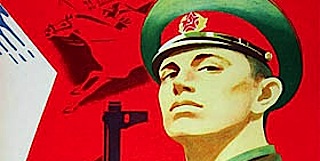Since there are some 200-250,000 veterans of the Red Army still alive, these celebrations have been extraordinarily important for Russian pride. For the Kremlin, the event is ideologically important for that it heightens the Russian sense of patriotism, a national feeling that Moscow always exploits politically. Aiding this is the summer premier of Fjodor Bondarshuk's film costing $30 million (US) of Stalingrad. These celebrations will be a fitting lead-in to the 2015 anniversary of the end of WWII.
While previously adhering to liberal retailing regulations, Russia will curtail alcohol sales and place restrictions on cigarette sales. There will be no alcohol consumed in public places and beer kiosks are a thing of the past. The price of vodka has been raised by one third, thus making Russian Vodka no cheaper than Estonia's. Photos of the effects of smoking will appear on cigarette packs and this will be seen by half the population – those that smoke.
The concern for national health will be addressed in other sectors. All Russians under 21, all students and veterans will have to undergo annual physical check-ups. The rest at least once every three years. This predicted to cost two hundred million euros. Finally, like elsewhere, it will be largest expenditure part of the annual budget. Up to now it's been the military.
The population expects that promises of the privatization of state-owned industry will finally be kept. This will become the most challenging problem of Dmitry Medvedev's government. So far, after important announcements in 2010 only 10% of the VTB bank has been privatized. This year Russia's largest bank, Sberpank will yield 7.6% of its shares to private interests, 20% of one of the largest chemical concerns, Apatiit, 25% of the third largest airline Sibir, 25% of electricity producer TGK-5 and 100% of the state gas transporter SG-Trans. In Western standards the privatization program is meager indeed, with the Kremlin retaining full control of a substantial majority of remaining lucrative enterprises.
It's still Vladimir Putin's tight grip on the government and parliament that interests most students of Kremlin behaviour. Piirsalu has stated that the crackdown on the “radical” political opposition that began last summer will continue in full tempo. It's expected that new and surprising legislation will further address this resistance to the power elite. But harsher political control is bound to further alienate liberal residents of larger cities and cause a wider rift between them and the relatively conservative “working class”. It's logically expected that Putin will in all decisions favour the latter, but when the cost of living takes a sharp upswing and living standards suffer, their enduring loyalty is an uncertainty.
Since 15% of Russia's GNP is supplied by gas and nafta sales, the international price is crucial for the Kremlin's ability to fulfill its social promises. Protests over protracted social shortcomings have been deflected so far, but it's uncertain that the government will be able to avoid them this time around. The international price of Russia's energy exports is not under Russia's control. Russia's state budget is balanced with income from at least $97 barrel nafta internationally. Anything less will cause serious concerns for Moscow.
The public awaits with baited breath the extent to which the prosecution of ex-defence minister Anatoli Serdjukov will proceed. Serdjukov, a former close political confidant of Putin was fired from his ministerial position for alleged selling government property at below market price and personally profiting millions. (It's ironical that Serdjukov, as the former chief of the tax department, was directly involved in the prosecution of billionaire Mihhail Hordokovsky, said to have been falsely accused of tax fraud.) Other defence ministry corruption cases are under investigation. Since Putin has privately avowed that his loyal underlings will always be protected, Kremlin watchers are closely monitoring, the Serdjukov case and others which will be a litmus test as to who in the power elite continues to have immunity from prosecution. Putin, by having the power to provide political shelter or withdrawing it has always used this as a control mechanism. Some observers predict that he will allow new prosecutions.
This year marks the beginning of major sports events in Russia that will last until 2018 and Russia wants to gain maximum positive international exposure from them. The competitions include world track and field championships, the Sochi winter Olympic Games, the first Formula 1 competition in Russia, international hockey championships and as a crowning finale the World Football championship in 2018. These for Putin are of highest importance and Russia is bound to invest abundant resources to guarantee successful spectacles.
Piirsalu has outlined some significant trends and developments, such as concern for the nation's health, unease with publically known corruption among the privileged, the possible alienation of his stalwart ‘working class' supporters, the frailty of Russia's state budget dependent on energy prices, things that will reverberate politically and societally. But will they cause responsive changes that benefit all levels of the population? Confident answers to this cannot yet be found.
Laas Leivat




